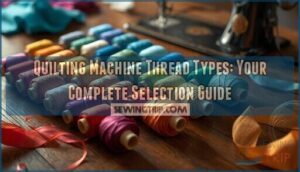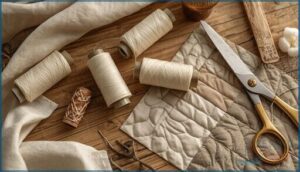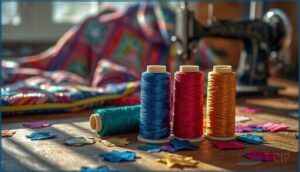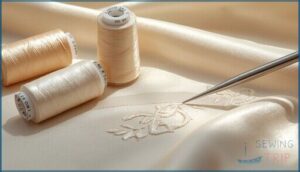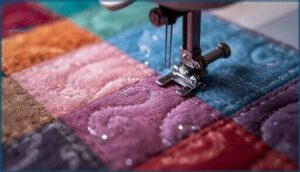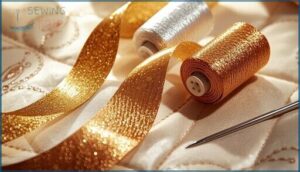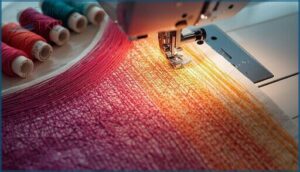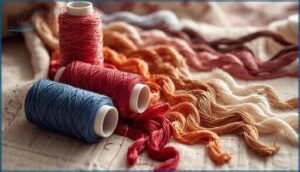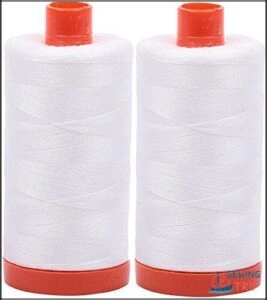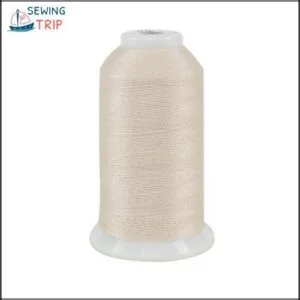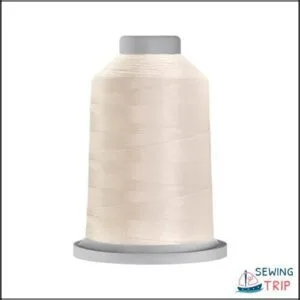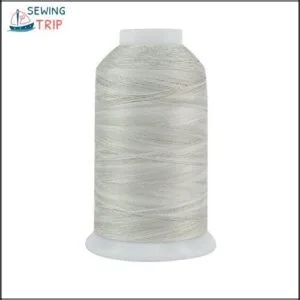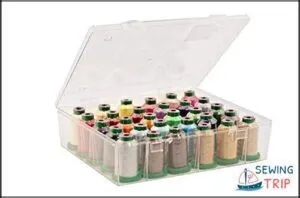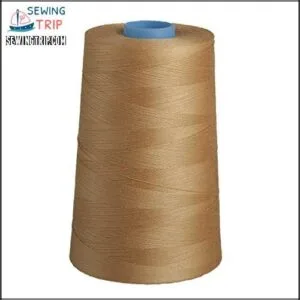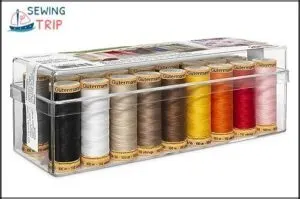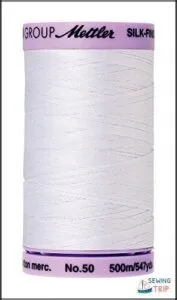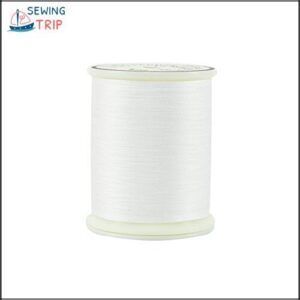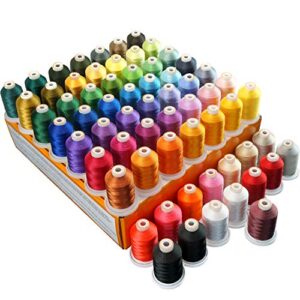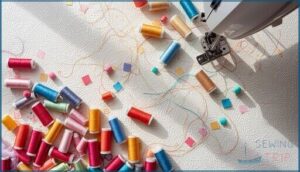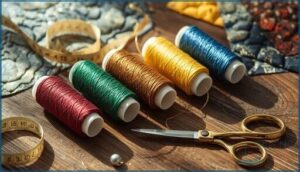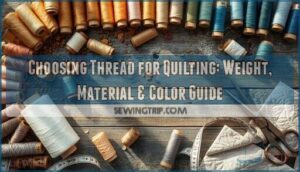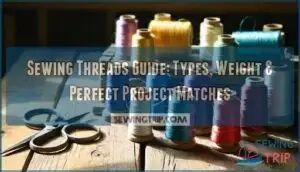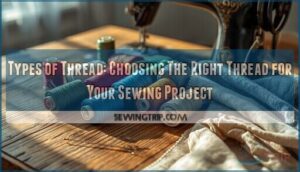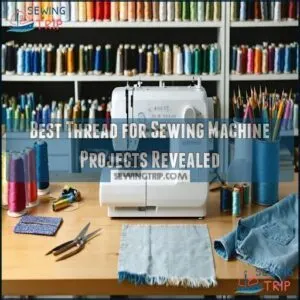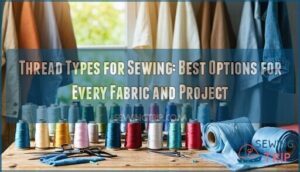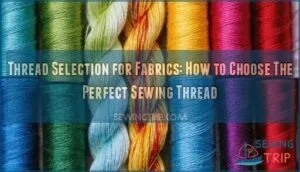This site is supported by our readers. We may earn a commission, at no cost to you, if you purchase through links.
Your quilting machine just jammed for the third time this morning, and you’re ready to throw that bargain-bin thread spool across the room! Here’s the truth: not all thread is created equal, and picking the wrong type can turn your beautiful quilt project into a frustrating nightmare.
Cotton, polyester thread, silk, metallic thread, blended—each quilting machine thread type brings its own superpowers (and weaknesses) to your project. Thread weight matters too, because a delicate 50-weight behaves completely differently than a chunky 12-weight decorative thread.
Understanding these differences means you’ll spend less time troubleshooting tension issues and more time creating stunning quilts that’ll last for generations.
Table Of Contents
- Key Takeaways
- What is Quilting Thread and Why It Matters
- Main Types of Quilting Machine Thread
- Top 10 Quilting Machine Threads
- 1. Aurifil Cotton Thread
- 2. Superior Threads Polyester Sewing Thread Cone
- 3. Glide Trilobal Polyester Thread
- 4. Superior Threads King Tut Quilting Thread
- 5. Isacord Embroidery Thread Set
- 6. Connecting Threads Cotton Thread
- 7. Gutermann Cotton Thread Set
- 8. Mettler Silk Finish Cotton Thread
- 9. Superior Threads Masterpiece Egyptian Cotton Sewing Thread
- 10. Brothread Polyester Embroidery Thread Kit
- Choosing Thread for Different Quilting Techniques
- Key Factors in Selecting Quilting Thread
- Frequently Asked Questions (FAQs)
- Conclusion
Key Takeaways
- Thread weight works backwards—lower numbers, like 12-weight, mean thicker thread for bold stitches, while higher numbers, like 50-weight, create fine, nearly invisible seams that won’t bulk up your quilt blocks.
- Cotton thread gives you that classic matte finish and blends beautifully into fabrics, but polyester dominates durability with 80-95% strength retention after 500 washes and superior break resistance during high-speed quilting.
- Match your thread type to your technique: 50-weight cotton for piecing keeps seams flat, monofilament disappears for stitch-in-the-ditch work, and specialty threads like variegated or metallic threads add visual wow-factor to decorative quilting.
- Thread selection directly impacts your quilt’s longevity and performance—invest in quality threads with low lint production, proper colorfastness, and appropriate tensile strength to avoid frustrating breakage and maintain stitch integrity through years of use.
What is Quilting Thread and Why It Matters
Quilting thread isn’t just any old spool you grab from the craft store! The quilting thread you choose directly impacts how your quilt looks, how long it lasts, and whether your stitching holds up through years of washing and use.
Different thread textures for sewing can create subtle dimensional effects or bold decorative touches depending on your project’s style.
Let’s break down the essentials you need to know before selecting thread for your next project.
Understanding Thread Weight and Thickness
Think of thread weight like a measuring tape for fiber thickness—it tells you exactly what you’re working with! Here’s the deal:
- Lower numbers = thicker thread (12-16 weight for heavy-duty projects)
- Higher numbers = finer thread (40-50 weight cotton thread for precision piecing)
- Weight affects everything: yarn construction, thread tension, and stitch visibility on your finished quilt
Choose wisely—thread selection impacts your entire quilting thread quality!
How Thread Affects Quilt Quality and Durability
Your thread choice directly shapes quilt longevity and performance! Polyester quilting thread maintains 80-95% tensile strength after 500 wash cycles, while conventional cotton breaks easier under tension.
Thread quality controls stitch visibility, color fading resistance, and fabric fraying at seams. High-grade threads prevent thread breakage, reduce lint production, and guarantee outstanding color fastness. Thread weight even impacts how your stitches age—choose wisely for quilts that last generations!
High-grade thread prevents breakage, reduces lint, and ensures your stitches age beautifully—choose wisely for quilts that last generations
Differences Between Quilting and Regular Thread
Quilting thread isn’t just rebranded sewing thread! Your quilting thread uses finer weights (40-60) with specialized fiber content—cotton or polyester blends engineered for multi-layer stitching.
Regular thread breaks faster through thick batting because it lacks breakage resistance. Thread finish matters too: quilting threads feature wax or glaze coatings for smoother feeding, plus outstanding color fastness to prevent fading.
Thread quality directly impacts thread selection success!
Main Types of Quilting Machine Thread
Now that you understand how thread weight works, let’s break down the actual thread types you’ll encounter. Each type brings something different to your quilting game, from classic cotton that quilters have loved for generations to specialty threads that add wow-factor to your projects.
Your choice depends on what you’re making, how you want it to look, and how much wear and tear it’ll face.
Cotton Thread for Traditional Quilting
Want that classic quilt look with a soft, matte finish? Cotton fiber gives you authentic texture that blends beautifully into your fabric!
The 50 weight option—like Aurifil 50 Weight Cotton Thread—is your go-to for piecing and quilting stitches. Mercerized versions offer vivid colors and extra strength, while pure cotton thread shrinks with your fabric blends, keeping those seams tight through every wash!
For an overview of how thread types impact quilting, understanding cotton, polyester, and specialty options is essential.
Polyester Thread for Strength and Durability
Strength meets flexibility in polyester—your workhorse for quilts that’ll survive countless washes! These threads resist shrinking, provide uniform stretch, and shed less lint than many alternatives, keeping your bobbin clean during long sessions.
Why polyester dominates durability:
- 40 to 50 weight polyester works beautifully on domestic machines
- Thermoplastic properties enable smooth, high-speed feeding
- Colorfastness stays strong—minimal fading after repeated washings
- Fabric compatibility spans cotton, blends, and synthetics
- Sewing performance rivals cotton at a budget-friendly price!
Silk Thread for Fine, Refined Stitching
Elegance assumes a prominent position when you pick silk thread for your premium projects. Fine stitching reaches new heights with 40 weight or lighter silk threads, offering delicate hand feel and natural luster that cotton simply can’t match.
You’ll love how low bulk makes micro quilting and fine appliqué a breeze on luxury fabrics. YLI Silk Thread stands out for refined quilting, though you’ll need careful tension adjustments with this slippery beauty.
Monofilament Thread for Invisible Quilting
Invisibility gives you total design freedom. Monofilament thread—usually clear nylon—creates flawless finishes by disappearing against fabrics, making it perfect for invisible appliqué and machine quilting where you want stitches to vanish.
You’ll need higher needle tension to prevent loose stitches, and watch for kinking with rough handling. This thread camouflage works magic, though it’s trickier to see when sewing dark fabrics!
Metallic Thread for Decorative Accents
Add that wow factor with metallic shine! Metallic thread creates stunning decorative stitches and quilting embellishments with gold, silver, and copper tones—perfect accent threads for topstitching rather than all-over quilting techniques.
You’ll need to adjust thread tension and needle size for its stiffness, and it’s prone to shredding. Thread selection here demands patience, but those thread effects? Absolutely worth it!
Variegated Thread for Color Interest
Watch your quilt come alive with variegated thread—it shifts colors automatically as you sew. This thread selection creates stunning ombre effects and gradient stitches through a unique dyeing process, adding tonal transitions without changing spools.
Perfect for quilting techniques like free-motion work, variegated threads offer:
- Color shifting across every stitch
- Thread blending that hides minor tension issues
- Built-in color fastness for lasting vibrancy
- Visual interest without extra effort
- Coordinated color palettes in single spools
Blended Threads for Versatility
Why choose between cotton’s soft finish and polyester’s strength when you can have both? Blended threads combine fiber mix ratios to deliver balanced performance—cotton wraps around polyester cores for durability with texture effects you’ll love.
You’ll find weight options from 40 to 60, plus color variations that suit any quilting techniques, from piecing to topstitching!
Top 10 Quilting Machine Threads
You’ve got the thread types down, now let’s talk brands. The right thread can make or break your quilting project, and honestly, some brands just perform better than others.
Here are ten high-quality quilting machine threads that’ll give you the strength, smoothness, and color range you need to create quilts that last.
1. Aurifil Cotton Thread
You’ll find Aurifil 50wt cotton thread at the top of nearly every quilter’s favorites list, and for good reason! This Italian-made beauty gives you smooth, lint-free stitching that glides through your machine like butter.
The 100% long-staple Egyptian cotton creates crisp, flat seams without bulk—perfect when you’re piecing intricate blocks. With over 270 colorfast shades to choose from, you can match any fabric palette.
Sure, it’s pricier than bargain brands, but the break resistance and consistent tension make every yard worth it!
| Best For | Quilters and sewers who want premium, low-lint thread that handles everything from delicate hand applique to high-speed machine quilting without breaking. |
|---|---|
| Material | 100% Cotton |
| Thread Weight | 50wt |
| Length | 5,118 inches |
| Brand | Aurifil |
| Use Case | Quilting & Applique |
| Lint Production | Low lint |
| Additional Features |
|
- Smooth Italian cotton reduces lint buildup and creates flat, professional seams
- Incredibly versatile—works for hand piecing, machine quilting, embroidery, and more
- Strong and durable despite the fine 50wt, so you get fewer breaks mid-project
- Significantly more expensive than standard thread brands
- Some users report occasional breakage issues despite the quality reputation
- Limited to natural white in this bundle, so you’ll need to buy separately for color matching
2. Superior Threads Polyester Sewing Thread Cone
While Aurifil shines in cotton, Threads’ So Fine! 50 polyester cone delivers a whole different breakthrough. This 3-ply thread packs 3,280 yards onto a single cone—that’s enough for multiple large quilts without constant respooling.
The matte finish mimics cotton’s soft look, but polyester’s strength means you won’t battle breakage during high-speed quilting. Practically lint-free, it keeps your bobbin area clean through marathon stitching sessions. At around $12 per cone, you’re getting serious yardage without the premium cotton price tag!
| Best For | Quilters and sewers who need a high-yardage, lint-free thread that works smoothly across multiple fabric types without constant cone changes. |
|---|---|
| Material | 100% Polyester |
| Thread Weight | 50wt |
| Length | 3,280 yards |
| Brand | Generic |
| Use Case | Quilting & Sewing |
| Lint Production | Virtually lint-free |
| Additional Features |
|
- Massive 3,280-yard cone eliminates frequent respooling during large projects
- Virtually lint-free polyester keeps machines clean during long stitching sessions
- Matte finish mimics cotton’s appearance while offering superior strength and break resistance
- Limited to pearl color only in this listing
- Some quality control issues reported with packaging and product condition
- Single 50-weight option may not suit projects requiring heavier thread
3. Glide Trilobal Polyester Thread
Here’s where trilobal technology really changes the game! Glide’s unique three-sided fiber structure creates that gorgeous linen-like luster you’ll love—way brighter than standard polyester without rayon’s fussiness. With 1,000 meters per spool and over 200 colors available, you’re set for any project vision!
The real genius? Minimal lint production keeps your longarm or domestic machine running clean, while that special lubricant coating maintains crazy-consistent tension. Fast quilting without constant thread breaks? Yes, please!
| Best For | Quilters and sewers who want vibrant, lint-free thread that runs smoothly through longarm or domestic machines without constant tension adjustments or breaks. |
|---|---|
| Material | Polyester |
| Thread Weight | 40wt |
| Length | 1,000 meters |
| Brand | GLIDE |
| Use Case | Quilting & Sewing |
| Lint Production | Lint-free |
| Additional Features |
|
- Trilobal fibers create beautiful luster and complete fabric coverage while maintaining consistent tension throughout your project
- 1,000-meter spools mean fewer thread changes, and the lubricant coating keeps machines running clean with minimal lint buildup
- Strong and colorfast polyester construction handles high-speed sewing without breaking, making it reliable for both quilting and general sewing
- Some users report quality control issues with defective spools that have pulled threads affecting tension
- May require testing with picky sewing machines before committing to large projects
- Performance can vary depending on your specific machine and project type
4. Superior Threads King Tut Quilting Thread
Egyptian-grown extra-long staple cotton takes quality up another level—King Tut’s 40-weight, 3-ply construction delivers serious stitch definition! You’re getting 2,000 yards per spool with that premium thread strength quilters rave about, perfect for both home machines and longarm setups.
The variegated Desert Wind color option? It brings gorgeous depth and motion to your quilting lines! This extremely low-lint thread feeds smoothly with consistent tension, making it ideal when you need visible, decorative stitching that really pops. Egyptian cotton at its finest!
| Best For | Quilters who want premium Egyptian cotton thread with excellent stitch definition and variegated color options for both home and longarm machines. |
|---|---|
| Material | 100% Cotton |
| Thread Weight | 50wt |
| Length | 2,000 yards |
| Brand | Superior Threads |
| Use Case | Quilting Projects |
| Lint Production | Extremely low lint |
| Additional Features |
|
- 100% Egyptian extra-long staple cotton delivers superior strength and minimal fraying
- 2,000-yard spools provide great value with consistent tension and extremely low lint
- Variegated Desert Wind color adds beautiful depth and motion to decorative quilting
- Color names like “Desert Wind” may appear lighter than expected in person
- Thread can deteriorate when exposed to direct sunlight over time
- Higher price point compared to standard quilting threads
5. Isacord Embroidery Thread Set
Looking for variety without breaking the bank? This Isacord set delivers 30 spools of colorfast polyester thread, each with an impressive 1000 meters! You’re getting vibrant colors that resist chlorine bleach and light exposure—perfect for vibrant embroidery work on your quilts.
The polyester blend manages dense designs beautifully with minimal lint production, and that high tensile strength means fewer breakage headaches during long stitching sessions. While the storage case isn’t always sturdy, the thread quality itself? Absolutely worth it for machine embroidery projects!
| Best For | Embroiderers and quilters who want a wide color selection and long-lasting thread without spending a fortune. |
|---|---|
| Material | Polyester Blend |
| Thread Weight | 40wt |
| Length | 39,370 inches |
| Brand | Isacord |
| Use Case | Embroidery |
| Lint Production | Minimal lint |
| Additional Features |
|
- 30 spools with 1000 meters each gives you tons of thread to work with
- Colorfast polyester resists fading from bleach and sunlight
- Minimal lint and high tensile strength means fewer thread breaks during projects
- Storage case often arrives damaged or feels flimsy
- Spindles inside may be missing or broken on arrival
- Returns and replacements can be a hassle if you get a bad box
6. Connecting Threads Cotton Thread
Budget-friendly quilters, meet your new best friend! These 1200-yard spools give you plenty of runway for larger projects without constant thread changes, and that 50-weight cotton thread strikes a beautiful balance between smooth stitching and solid coverage. You’ll get consistent color accuracy across batches—critical for piecing accuracy!
Sure, you’ll need to clean your machine’s presser foot area more often than with premium threads, but at this price point? It’s a trade-off hobby quilters happily make for reliable, 100% cotton performance.
| Best For | Quilters and sewers who need a reliable, budget-friendly cotton thread for large projects without sacrificing quality. |
|---|---|
| Material | 100% Cotton |
| Thread Weight | 50wt |
| Length | 5,000 yards |
| Brand | Generic |
| Use Case | Quilting & Sewing |
| Lint Production | Less lint |
| Additional Features |
|
- Extra-long 5,000-yard cones minimize thread changes during big quilting or sewing projects
- 100% cotton with extra-long staple creates smoother stitching and less lint buildup
- Satin finish adds a subtle, professional-looking sheen to finished work
- Some customers have reported delivery issues with orders
- Requires more frequent cleaning of the presser foot area compared to premium threads
- Limited information available on thread strength and breakage resistance
7. Gutermann Cotton Thread Set
This German-engineered set brings you 26 spools of mercerized cotton with that signature smooth finish quilters crave! You’ll love the slight sheen that makes traditional patchwork pop, plus the color range covers your neutrals and brights beautifully.
Each spool delivers 50-100 meters—perfect for piecing projects where you need consistent stitch formation without excessive lint buildup. The best part? Your seams practically disappear on matched fabrics thanks to that silky-smooth mercerization process, and the portable storage box keeps everything organized for sewing gatherings!
| Best For | Quilters and sewers who want a reliable cotton thread collection with good color variety for piecing, embroidery, and general sewing projects. |
|---|---|
| Material | Cotton |
| Thread Weight | Not specified |
| Length | 3,937 inches |
| Brand | Gutermann |
| Use Case | Sewing & Quilting |
| Lint Production | Not specified |
| Additional Features |
|
- Mercerized cotton gives a smooth, lustrous finish that makes stitches nearly invisible on matched fabrics
- Portable storage box keeps all 26 spools organized and easy to transport to classes or sewing groups
- Versatile enough for quilting, embroidery, and everyday alterations with minimal lint buildup
- Smaller spool sizes (50-100 meters) mean you’ll run through thread faster on large projects
- Higher price point compared to similar thread sets on the market
- Some buyers have reported receiving polyester instead of cotton, especially with international orders
8. Mettler Silk Finish Cotton Thread
This 100% long-staple Egyptian cotton thread gives you that luxurious silk-like feel your quilts deserve! The mercerization process boosts strength and crushes shrinkage during washing, so your seams stay flat and gorgeous through countless trips to the laundry.
You’ll get vibrant, colorfast colors that refuse to fade—even after multiple wash cycles and sun exposure. The subtle sheen enhances stitch definition beautifully on quilt tops and bindings, while the smooth texture glides through piecing and topstitching without skipping or fraying. Available in 150-500 meter spools!
| Best For | Quilters and sewers who want a premium thread with silk-like sheen and superior strength for heirloom projects that need to withstand frequent washing. |
|---|---|
| Material | 100% Cotton |
| Thread Weight | 50wt |
| Length | 547 yards |
| Brand | Generic |
| Use Case | Quilting & Sewing |
| Lint Production | Low lint |
| Additional Features |
|
- Mercerized cotton provides excellent breaking resistance and maintains stitch quality through multiple washes
- Smooth texture with subtle sheen enhances stitch definition and reduces tangling during piecing and topstitching
- Long-staple Egyptian cotton offers luxurious feel and colorfast vibrance that resists fading
- Higher price point compared to standard cotton thread brands
- Limited color selection with only white specified in this product
- Requires specific needle size (80-90) for optimal performance, which may need adjustments to your usual setup
9. Superior Threads Masterpiece Egyptian Cotton Sewing Thread
Want that triple-threat combo of strength, smoothness, and zero lint? This 100% extra-long staple Egyptian cotton thread delivers with its three-ply construction that won’t bulk up your seams! At 50-weight, you’ll breeze through piecing, quilting, and bobbin work on any machine—home or longarm.
The matte finish blends beautifully into fabric for nearly invisible stitches, while the colorfast dye keeps shades vibrant through countless washes. Available in 600-yard spools, it’s your reliable workhorse for traditional and modern quilts alike!
| Best For | Quilters and sewers who want smooth, strong cotton thread that won’t leave lint buildup in their machines while delivering nearly invisible stitches. |
|---|---|
| Material | 100% Cotton |
| Thread Weight | 50wt |
| Length | 600 yards |
| Brand | Superior Threads |
| Use Case | Piecing & Quilting |
| Lint Production | Low lint |
| Additional Features |
|
- Triple-ply Egyptian cotton construction provides exceptional strength without adding bulk to seams
- Ultra-low lint production thanks to fine spinning and finishing techniques keeps machines cleaner
- Versatile 50-weight thread works perfectly for piecing, quilting, general sewing, and bobbin use across all machine types
- Single 600-yard spool size might not be enough for larger quilting projects without buying multiple spools
- Some customers reported receiving different colors than ordered, so color accuracy can be hit-or-miss
- Thread weight or finish may not suit everyone’s preferences—some users found it too heavy or not bright enough for their specific needs
10. Brothread Polyester Embroidery Thread Kit
Need versatility without breaking the bank? This polyester embroidery thread kit packs 40-64 spools with 1000M (1100Y) each, covering everything from light creams to bold blues—including extras of white, black, and red.
The locking base resists tangling, while the colorfast polyester accommodates high-speed stitching on Brother, Janome, Babylock, and more without excessive lint.
Perfect for embroidery and decorative quilting projects, though you’ll want a thread stand for those larger spools. Great value for hobbyists building their stash!
| Best For | Hobbyists and beginners who want a wide color range for embroidery and quilting projects without spending a fortune. |
|---|---|
| Material | 100% Polyester |
| Thread Weight | 40wt |
| Length | 1,100 yards |
| Brand | New brothread |
| Use Case | Embroidery & Quilting |
| Lint Production | Not specified |
| Additional Features |
|
- 64 spools with 1100 yards each give you tons of thread and color options to work with
- Locking base design helps prevent annoying tangles during projects
- Works with most major embroidery machine brands like Brother, Janome, and Babylock
- You can’t buy individual colors separately if you run out of a specific shade
- Larger spools might need a thread stand to work smoothly with your machine
- Some users reported occasional snagging or winding issues during use
Choosing Thread for Different Quilting Techniques
Here’s the thing: not all quilting techniques play nice with the same thread. Whether you’re piecing together tiny blocks, running your longarm machine at full speed, or hand-stitching a binding, your thread choice can make or break the whole project.
Let’s break down exactly which threads work best for each technique, so you can nail every stitch with confidence.
Best Thread for Piecing Quilt Blocks
Piecing tips start with thread weight! You’ll want 50 weight cotton thread for most quilting piecing—it keeps seams strong without adding bulk at your seam allowances.
Fabric choice matters too: many quilters pick light grey or cream so your thread selection disappears into the quilt blocks. Fine threads boost seam quality and quilt durability by reducing buildup where multiple seams meet!
To learn more, explore this overview of thread weight and types for thorough quilting guidance.
Thread Selection for Machine Quilting
Machine quilting demands low-lint polyester thread or 40-50 weight cotton thread—both feed smoothly at higher quilting speed. Thread tension settings affect stitch quality, so calibrate your machine for balanced stitches.
Choose colors that blend with your fabric or go bold for contrast. So Fine polyester gives you strength without bulk, while Aurifil cotton offers that traditional matte finish you’ll love!
Optimal Thread for Hand Quilting
Hand quilting thrives with 100 percent cotton thread in 12 to 40 weight—your needle selection matters here! Waxed or glazed finishes reduce tangling and boost stitch consistency through dense layers.
Thread visibility depends on weight, so experiment to master thread tensioning. Cotton thread delivers that classic matte look, while linen adds heirloom charm with stronger tensile strength. These quilting techniques reward patience!
Thread Types for Appliqué Work
Appliqué techniques demand smart fiber choices—50 weight cotton thread blends seamlessly for turned-edge work, while 60 to 80 weight polyester delivers delicate stitching with minimal bulk.
For raw-edge appliqué, polyester thread resists fraying beautifully.
Thread visibility impacts stitch effects dramatically, so monofilament works wonders for invisible edges.
Match your thread selection guide to fabric weight—silk adds refined sheen, while cotton thread maintains that classic quilting thread types look!
Longarm Quilting Thread Requirements
Longarm machines crave thread weight that can keep pace with lightning-fast quilting speed! You’ll want 40 weight or 50 weight polyester thread for smooth, consistent tension—cotton works too, but requires more careful thread tension adjustment.
Pair your thread weight with the right needle selection (size 16 for most projects), and don’t forget thread lubrication to reduce friction during those marathon longarm quilting sessions!
Thread for Stitch-in-the-Ditch Quilting
Stitch-in-the-ditch demands near-invisible stitches, so you’ll love monofilament threads—clear for light fabrics, smoke-tinted for dark! Fine 80–100 weight cottonized polyester creates that disappearing act while maintaining stitch balance.
Pair your thread selection with a size 70/10 needle for crisp ditch quilting tips without visible punctures. Thread visibility? Almost zero when you match your thread weight to fabric tone—that’s the magic of smart machine quilting!
Binding and Topstitching Thread Choices
Your quilt’s edge deserves a showstopper finish! Here’s how thread selection transforms binding techniques and topstitching:
- Cotton threads blend beautifully with quilting fabrics, creating that traditional, matte edge finishing you love
- 50 wt thread balances thread visibility with stitch enhancement—no bulk, all smoothness
- Contrasting colors turn topstitch effects into bold design statements on modern quilts
Match thread weight to your binding vision, and you’ll nail that perfect edge every time!
Key Factors in Selecting Quilting Thread
You’ve learned about thread types and techniques, but how do you pick the right one when you’re standing in the aisle with dozens of spools staring back at you?
The secret lies in five key factors that’ll guide your decision every single time! Let’s break down what really matters so you can shop with confidence and build quilts that last.
Thread Strength and Longevity Considerations
Think of thread strength like the backbone of your quilt—it needs to hold up! When you’re doing Thread Selection and Guide reviews, check Tensile Testing results: polyester threads resist 15–25 pounds of force, while cotton threads break around 8–10 pounds.
Thread Durability depends on Abrasion Resistance and Fiber Blends. Plus, Thread Weight affects longevity, and Lint Production signals wear over time!
Color Selection and Colorfastness
Picking the right Thread Colors isn’t just about looks—you need Color Fastness to prevent Fabric Bleeding. When you’re doing Thread Selection and guide checks, look for Lightfast Testing ratings (3–5 scale) and Dye Stability notes on quilting thread labels.
Color Theory helps with Color Matching, while colorfast Quilting Threads keep dark dyes from transferring onto light fabrics during washing!
Lint Production and Machine Compatibility
Your machine’s hook area tells the whole story—Cotton Thread sheds short fibers at high speeds, so you’ll need frequent cleaning with a brush after each big quilt. Polyester Thread runs cleaner and extends Quilting Efficiency on longarms!
- Lint Production: Spun cotton creates visible Fiber Shedding; continuous-filament polyester stays smooth
- Machine Maintenance: Heavy buildup causes skipped stitches and noisy Thread Tension
- Lint Reduction: Low-lint threads minimize hook debris during Machine Quilting sessions
Thread Tension and Breakage Prevention
Balanced tension starts with matching your Needle Compatibility to Thread Weight—mismatched pairs cause friction and snap. Clean your Thread Path regularly, because lint buildup disrupts Tension Balance faster than you’d think.
Machine Calibration matters too; test on scrap fabric after adjusting top tension, especially with metallic threads. Breakage Prevention is all about syncing needle size, thread type, and Machine Quilting settings for smooth, reliable stitches every time.
Proper Thread Storage and Handling
Your thread stash deserves climate-controlled care! Storage Tips include keeping spools at 60–75°F in dry air—40 to 60 percent humidity prevents Fiber Preservation issues like mold.
Spool Management works best with labeled racks organized by Thread Weight, while Humidity Control (silica packs!) stops cotton from swelling. Protect Color Fastness and reduce Lint Production by avoiding sunlight and rotating your Quilting Thread stock regularly.
Frequently Asked Questions (FAQs)
What type of thread is best for machine quilting?
In the context of nailing your quilting projects, there’s no one-size-fits-all answer. The best Machine Quilting Thread depends on Quilting Techniques.
The Thread Visibility needs, Thread Weight preferences, Machine Compatibility, Fiber Materials choice, and Thread Durability requirements you’re after.
Which is heavier, 40 wt or 50 wt thread?
In thread weight comparison, 40 wt is heavier than 50 wt.
The numbering flips—smaller numbers mean thicker thread.
So 40 wt packs more fiber per inch, creating bolder stitch visibility and greater thread durability.
Why is the aurifil thread so good?
Aurifil’s extra-long staple Egyptian cotton delivers outstanding strength with ultra-low lint production.
You’ll love the smooth finish that glides through your machine, plus the colorfast dyes maintain vibrancy through countless washes—that’s quilting excellence.
How often should quilting machine needles be replaced?
Sharp thinking makes all the difference! You should swap your sewing machine needle every 8-10 hours of machine quilting to prevent thread breakage and keep stitch quality crisp.
Fresh needles mean better sewing machine maintenance and fewer headaches!
Can quilting thread be used for embroidery?
Yes, you can absolutely use quilting thread for embroidery.
Polyester thread works beautifully for most designs, while cotton thread creates a softer, vintage look.
Just adjust your machine tension and slow your stitch speed slightly.
How to prevent thread breakage during quilting?
You might think thread breakage is random, but it’s not! Balance your thread tension, match needle selection to thread weight, and slow your quilting speed.
Fresh needles and proper fabric preparation make all the difference.
Best thread tension for different quilting techniques?
Tension control adjusts thread balance for ideal stitch quality. For machine quilting with dense patterns, you’ll need slightly higher tension.
Piecing uses lighter settings to prevent puckering, while fabric stretch demands firmer control for secure seams.
Are prewound bobbins better for machine quilting?
Prewound bobbins deliver exceptional stitch quality and thread efficiency. They’re wound with controlled tension for consistent bobbin tension, reduce downtime between changes, and support faster quilting speed—though machine compatibility varies, so test first.
Can you mix thread types in one quilt?
You can absolutely mix thread types in one quilt.
Just test tension first on a sample sandwich, match needle sizes to each thread, and document your combinations for consistent stitch quality.
How does thread affect washing and care instructions?
Your quilting thread choice dictates wash temperature, detergent type, and drying method.
Cotton threads need gentle care to prevent yellowing, while polyester threads withstand heat better.
Color fastness and lint production vary substantially by thread type.
Conclusion
Think of mastering quilting machine thread types like building your toolkit—once you know which tool does what, every project becomes smoother and more satisfying. You’ve got the knowledge now: cotton for tradition, polyester for strength, specialty threads for wow-factor moments.
No more frustrating jams or mystery tension issues. Stop second-guessing yourself at the thread aisle, grab exactly what your quilt needs, and watch your finished projects transform from good to absolutely breathtaking!
- https://www.thelittlemushroomcap.com/so-fine-threads-by-superior-threads/
- https://sewing.patternreview.com/SewingDiscussions/topic/101674
- https://www.fil-tec.com/Glide-Quilting
- https://www.aurifil.com/wp-content/uploads/2018/08/AURIFIL-MAY2018.pdf
- https://www.amann-mettler.com/fileadmin/downloads/brochures/english/Mettler_Range_brochure_ENG_A4_METROSENE_single_pages_XS.pdf

